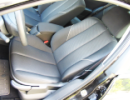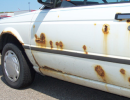

Shopping for a used car, the terms Non VAT qualifying and Gross VAT qualifying will sooner or later show up. These terms are important for company cars; buying a car privately, it is of no importance.

When you buy a car, it is nice to have a clean interior, without spots in the upholstery and broken parts. However, these defects are easily solved with a little soap and water and some small repairs. It will become more of a problem, if the upholstery is ripped.

When you are finalising your purchase, a contract will have to be drawn up. The contents of this contract will largely depend on the salesman, providing that you are not interfering with it yourself. It is important that you do not sign a contract without knowing exactly what is in it. So, make sure that all the promises are written down: e.g. when the car is delivered with a fresh MOT, make sure it is written down in the contract.

To be able to judge the body work of a car, you need a keen eye. Dents and scratches are easy to spot, but in general these irregularities do not hide major damage. Remember that you are buying a used car, which will never be in mint condition. In this article we look for indicators that point out serious damage from accidents in the past.
